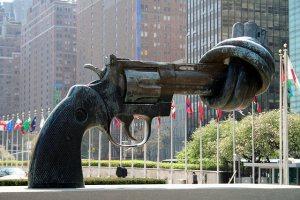
Image from communities.washingtontimes.com
On Tuesday, the United Nations General Assembly signed off on a landmark treaty to regulate the multibillion-dollar international arms trade, despite warnings from U.S. gun rights advocates that the pact could be threatening to the U.S. gun market. However, the vote capped a more than decade-long campaign by activists and some governments to regulate the $60 billion global arms trade and try to keep illicit weapons out of the hands of terrorists, insurgent fighters, and organized crime.
The U.N. Arms Trade Treaty (ATT) requires countries to regulate and control the export of weaponry such as battle tanks, combat vehicles and aircraft and attack helicopters, as well as parts and ammunition for such weapons. It also provides that signatories will not violate arms embargoes, international treaties regarding illicit trafficking, or sell weaponry to countries for genocide, crimes against humanity or other war crimes.
The General Assembly vote was 154 to 3, with 23 abstentions. Some abstaining countries, like India and Egypt, felt the treaty did not go far enough on its language regarding terrorism and human rights. The three countries rejecting the treaty were Syria, Iran, and North Korea.
Proponents of the treaty said it could make it much harder for regimes committing human rights violations to acquire arms in conflicts such as the brutal civil war in Syria. The Obama administration, U.S. Secretary of State John Kerry, and some other American organizations praised the treaty as “a strong, effective, and implementable arms trade treaty that can strengthen global security while protecting the sovereign right of states to conduct legitimate arms trade.”
Frank Jannuzi, deputy executive director of Amnesty International USA said, “The voices of reason triumphed over skeptics, treaty opponents and dealers in death to establish a revolutionary treaty that constitutes a major step toward keeping assault rifles, rocket-propelled grenades and other weapons out of the hands of despots and warlords who use them to kill and maim civilians, recruit child soldiers and commit other serious abuses.”
On the flip side, American gun rights activists insist the treaty is riddled with loopholes and is unworkable in part because it includes “small arms and light weapons” in its list of weaponry subject to international regulations. They do not trust U.N. assertions that the pact is meant to regulate only cross-border trade and would have no impact on domestic U.S. laws and markets. Some, like Texas Attorney General Greg Abbott, are deeply concerned that the U.N. arms control treaty will jeopardize the rights gun owners are guaranteed by the Constitution, and Abbott threatened that his state would “lead the charge” to have it overturned in court “as a violation of the U.S. Constitution” should Obama ultimately approve the treaty. Abbott said it could “draw law-abiding gun owners and gun store operators into a complex web of bureaucratic red tape created by a new department at the UN devoted to overseeing the treaty.”
Likewise, the National Rifle Association (NRA) has portrayed the draft treaty as a threat to gun ownership rights enshrined in the U.S. Constitution and has lobbied to defeat the proposal at the U.N. The NRA last week praised the Senate’s passage of an amendment to the Democratic budget proposal that would prevent the U.S. from entering into the treaty. The sentiment among conservative and moderate senators concerned that the treaty represents an infringement of Second Amendment rights had not changed in light of Tuesday’s U.N. vote. For the treaty to be ratified, two-thirds of the 100 lawmakers will have to approve it.
The landmark U.N. treaty will take effect after 50 countries ratify it, and a lot will depend on which ones ratify and which ones don’t, and how stringently it is implemented.
Enforcement is left up to the nations that ratify the treaty. In considering whether to authorize the export of arms, a country must evaluate whether the weapons would be used to violate international human rights laws or employed by terrorists or organized crime. A country must also determine whether the weapons would contribute to or undermine peace and security. The treaty requires these countries to cooperate on its implementation and to assist each other in investigating and prosecuting violations.
Never before has there been an international treaty regulating the global arms trade.

